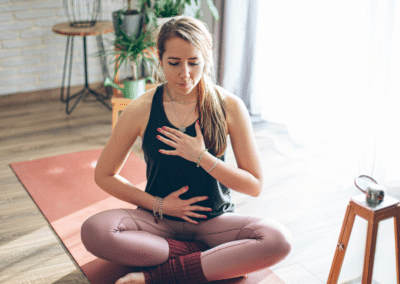Are your allergies getting to you? When you are suffering from a stuffy nose, breathing can be challenging enough while you’re awake – trying to get a good night’s sleep with a stuffy nose can feel almost impossible. So, What’s causing the problem? Why are you struggling to breathe through your nose? Read on for an explanation and our tips on how to make yourself more comfortable and breathe easier while you try and catch some ZZZs.
What Causes Nasal Congestion?
Nasal congestion (aka: a stuffy nose) occurs when the tissues lining the nose become swollen due to inflamed blood vessels. This often occurs due to colds, flu, sinus infections, or environmental allergies such as hay fever or dust mites.
How Does Congestion Affect Sleep?
Being unable to breathe properly reduces your quality of sleep, which can negatively impact your body. Issues associated with deprivation arise as there are associations linked with increased blood pressure, heart rate, and inflammation of the heart. Getting good rest is essential for heart health, but sleep deprivation has other health repercussions such as a lowered immune system, leaving more susceptible to colds, flu, and infections – creating a vicious health cycle.
Changes in how the body processes glucose have been detected in people who have disturbed sleep patterns, thus leading to an increased likelihood of developing Type 2 Diabetes. Sleep deprivation can also affect fertility, sex drive, and cause mood changes. We all notice how our mood changes after a bad night’s sleep, leaving us more irritable. If sleeplessness is an ongoing problem, this can lead to anxiety and depression. When your breathing is compromised you are also more prone to snoring can reduce your quality of sleep and may also result in your partner being sleep deprived.
Relief Starts During the Day
Taking steps during the day to improve your congestion symptoms is crucial. To help ensure you get the most out of your night, you may need to change some of your damaging daytime habits.
Reducing caffeine and alcohol intake, especially later in the day, can help you sleep better at night and reduce the likelihood of inflammation in the nasal passage. For some, consuming alcohol triggers upper respiratory symptoms such as sneezing and a blocked or runny nose. While reducing certain drinks is helpful, increasing the amount of water you drink may also aid the softening of mucus build-up. Hot teas, especially low-caffeine or herbal, aid with necessary hydration.
Resisting the urge to blow your nose can be challenging, but the less you blow your nose, the better! It may provide temporary relief, but forcing air through the nasal passage may further inflame the swelling and cause more irritation. If you need to blow your nose, do so gently and one nostril at a time.
Remedies and Treatments
Finding ways to thin mucus will help it drain from your sinuses and relieve your symptoms.
- Before going to bed, take a hot shower or steam your face by hovering over a bowl of warm water with a towel covering your head as the steam will help to open up your nasal passages. If you’d like, you can add a few drops of eucalyptus essential oils to the water.
- Using a humidifier in your bedroom or essential oils in a diffuser may also make the air more breathable by adding moisture.
- Nasal rinsing using a Neti Pot and saline solution will help clear the blockage, or at the very least, soften the mucus partially.
- Nasal dilators such as O2 Nose Filters help to widen the nostrils internally to increase the flow of air. They also block allergens and pollution from entering the nasal passages, so they are perfect to wear while you’re out and about during your day.
Testing and implementing some of the options above gives you a higher chance of combating congestion and to help make it easier to sleep while your nose is blocked up. By trying natural routes instead of instantly reaching for pharmaceutical intervention, you allow your body the opportunity to rectify the issue more gently. However, if you are not getting any relief and are constantly plagued by a stuffy nose and disrupted sleep, talk to a medical professional and get your breathing back to normal as soon as possible.
Take preventive measures this allergy season.
Click here for a FREE (+S&H) sample pack to see which size works best for you!



